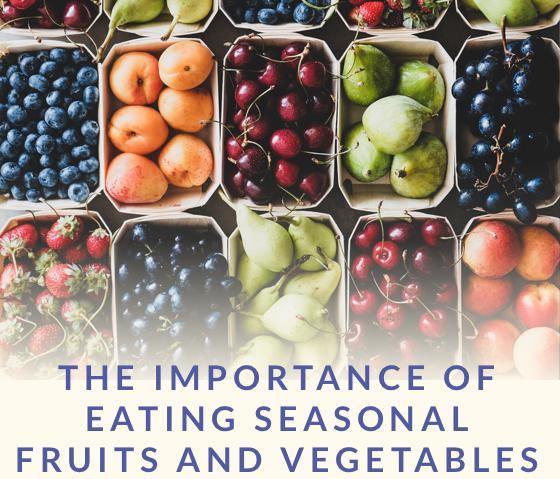As the weather changes from season to season, the variety of fruits and vegetables available changes as well. Dr. Sebi always advocated making fresh produce the basis of your daily diet and making sure that those fruits and vegetables are in-season has a lot of benefits for your health, your wallet, and the environment.
Here’s why you should try to eat seasonally — all year long!
Benefits of Eating Seasonal Produce
Because of modern agriculture and food processing techniques, most foods are available year-round. However, the techniques they use to ripen fruits and vegetables to make them available at any time of the year often result in the loss of nutrients, which doesn't happen when they are allowed to ripen on their parent plant.
Thus, seasonal food is fresher, tastier, and more nutritious than food consumed out of season.
1. Better Taste
It's not your imagination: Seasonal produce tastes fresher, sweeter, and crispier! Just think of sinking your teeth into a ripe, juicy peach or enjoying the burst of sweetness from a perfectly ripened berry.
When fruits and vegetables are in-season, they are naturally ripened and harvested at the right time, keeping all their flavor and nutrition intact. On the other hand, when not in season, produce has to be harvested early and kept in refrigeration so it doesn't spoil during transportation, and then be heated in a hothouse to artificially ripen it before it goes onto the shelves.
By choosing locally grown, seasonal produce, you can experience the natural flavors and textures that Mother Nature intended. The taste alone can be a delightful motivation to include these fruits and vegetables in your daily diet.
2. More Nutrition
When fruits and vegetables are in season, they’re harvested at their peak ripeness, ensuring optimal nutrient content. Freshly picked produce contains higher levels of nutrients, minerals, and antioxidants, which are essential for supporting our immune system, boosting energy levels, and promoting overall vitality. You are consuming produce the way nature intended.
For out-of-season produce, antioxidants, phytonutrients, and minerals such as folate decline rapidly when produce is stored for long periods of time, and all this process also causes changes in taste, texture, and freshness.
By consuming in-season fruits and vegetables, we can maximize the nutritional benefits and nourish our bodies more effectively.
3. Less Expensive
If you're consuming fruits and vegetables that are not in-season in your region, they have to be sourced from locations with different climates, thus increasing their cost due to traveling and storage expenses.
But when farmers are harvesting a large abundance of produce because the crop is in season, the cost of the produce will go down, making it cheaper for you. It's a win-win for your health and your wallet.
4. Avoid Pesticides
When your food is sourced from other locations, you can't be sure if it has been sprayed with pesticides or herbicides that can be harmful to your health. Many countries have very relaxed laws about the kind of chemicals that get sprayed on their food, so eating local and in-season organic vegetables is your safest bet.
5. Synchronize Your Diet With Nature
Eating in-season just makes sense. For example, in fall and winter, nature provides us with vegetables that are great for making hot soups, stews, and other warming comfort foods, while in hotter months, we have crispier flavors, ideal to make fresh salads and smoothies.
6. Good for the Environment
Embracing in-season fruits and vegetables aligns with sustainable practices and supports local agriculture. When we choose produce that is in-season, we reduce the need for extensive transportation and storage, resulting in lower carbon emissions and energy consumption.
Additionally, by purchasing from local farmers, we contribute to the preservation of farmland and support the regional economy.
7. Culinary Exploration and Creativity
Eating in-season fruits and vegetables introduces us to a wider variety of flavors and encourages culinary creativity. As each season brings forth different produce, it presents an opportunity to explore new recipes and experiment with different cooking techniques.
This culinary adventure not only keeps our meals exciting and enjoyable but also ensures a diverse intake of nutrients, as we rotate through the seasonal offerings.
Tips for Eating Seasonally
- Get familiar with what produce is in-season.
- Visit as many local farmer's markets as you can, they all have unique treasures.
- Look out for sales and stock up.
- Learn the proper storage technique for each produce, this helps extend their freshness and flavor even longer.
- Try new recipes! Challenge yourself to create a new salad, sauce, or smoothie.
- Try freezing or dehydrating produce for the future. Instead of letting it go to waste, save it for a delicious smoothie or snack.
- Don't forget to compost!
Try to Eat Local, Too!
Along with eating seasonally, you should also strive to eat locally. Local food benefits the environment. Purchasing locally grown foods helps support local farms and maintains farmland and open space in your community.
Local farmers are also less likely to apply pesticides and herbicides to control weeds and insects than conventional producers, which results in less harmful toxins entering your body.
Lastly, eating seasonally and locally reduces your carbon footprint since food doesn't have to be transported that far away, which is better for the environment.


















































